Understanding Benner's Theory on Nursing Practice: GCNNK1 Assignment
VerifiedAdded on 2022/12/28
|8
|2327
|44
Report
AI Summary
This report delves into Patricia Benner's theory of nursing practice, emphasizing the development of skills and knowledge through experience, moving from novice to expert. It outlines the five stages of competence: novice, advanced beginner, competent, proficient, and expert, detailing the characteristics and functions of nurses at each stage. The report further discusses advanced nursing practices and their importance in the evolving healthcare landscape. It also relates Benner's theory to the NMBA standards of practice, highlighting how the theory can be applied to enhance nursing performance. The conclusion underscores the critical role of nursing in the hospitality sector, the need for continuous improvement, and the utility of Benner's model in evaluating and enhancing nursing capabilities. The report is supported by relevant references from books and journals.
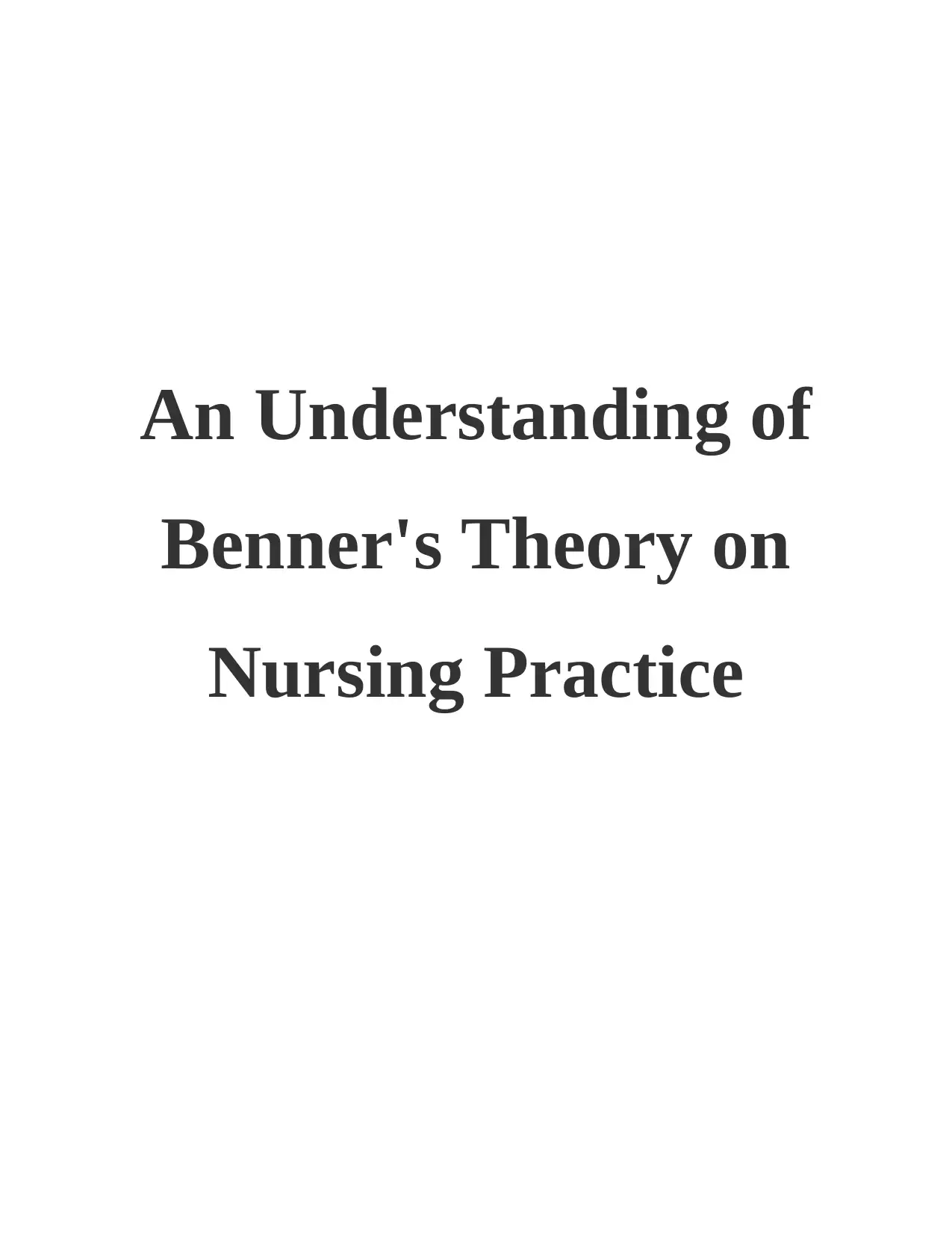
An Understanding of
Benner's Theory on
Nursing Practice
Benner's Theory on
Nursing Practice
Paraphrase This Document
Need a fresh take? Get an instant paraphrase of this document with our AI Paraphraser
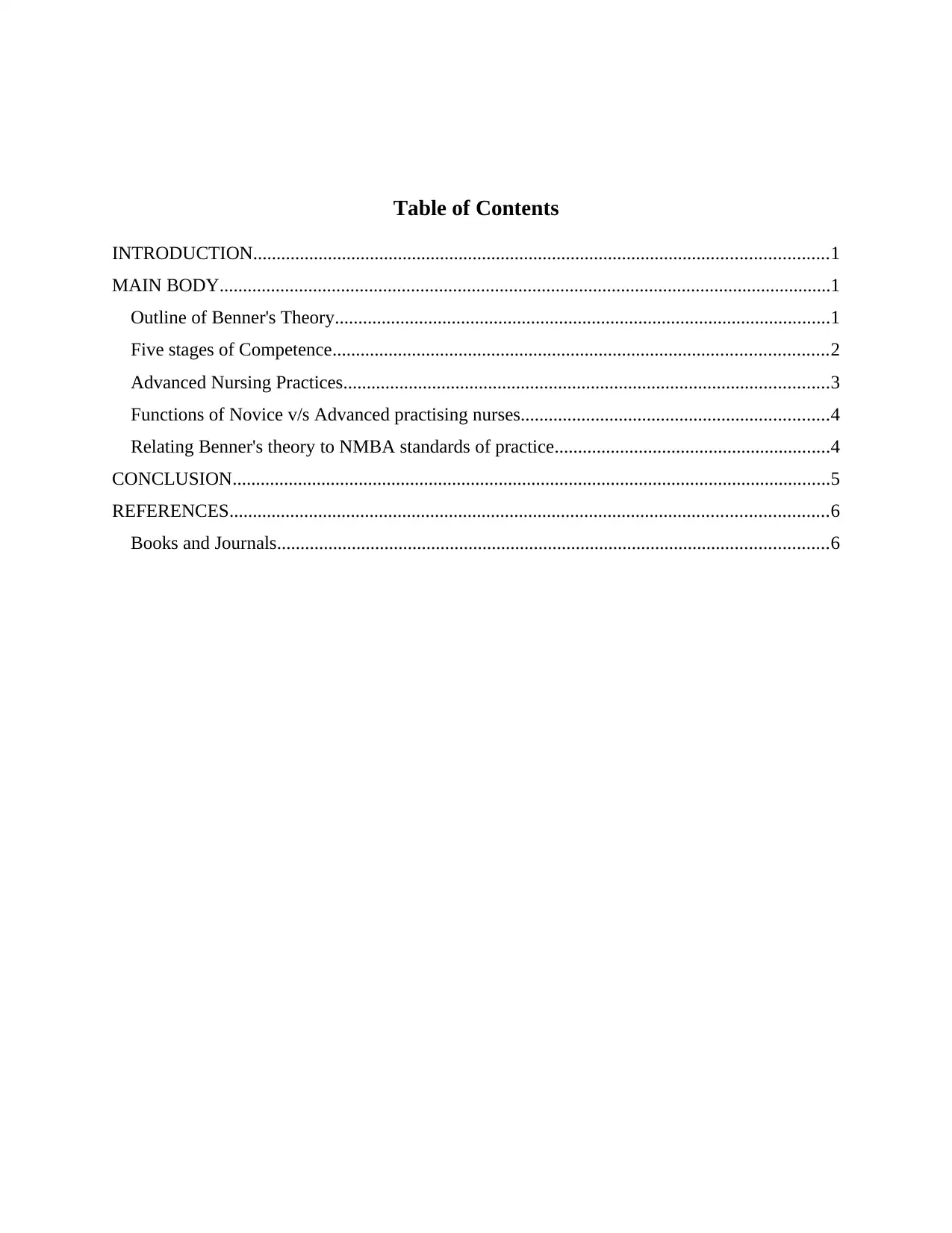
Table of Contents
INTRODUCTION...........................................................................................................................1
MAIN BODY...................................................................................................................................1
Outline of Benner's Theory..........................................................................................................1
Five stages of Competence..........................................................................................................2
Advanced Nursing Practices........................................................................................................3
Functions of Novice v/s Advanced practising nurses..................................................................4
Relating Benner's theory to NMBA standards of practice...........................................................4
CONCLUSION................................................................................................................................5
REFERENCES................................................................................................................................6
Books and Journals......................................................................................................................6
INTRODUCTION...........................................................................................................................1
MAIN BODY...................................................................................................................................1
Outline of Benner's Theory..........................................................................................................1
Five stages of Competence..........................................................................................................2
Advanced Nursing Practices........................................................................................................3
Functions of Novice v/s Advanced practising nurses..................................................................4
Relating Benner's theory to NMBA standards of practice...........................................................4
CONCLUSION................................................................................................................................5
REFERENCES................................................................................................................................6
Books and Journals......................................................................................................................6
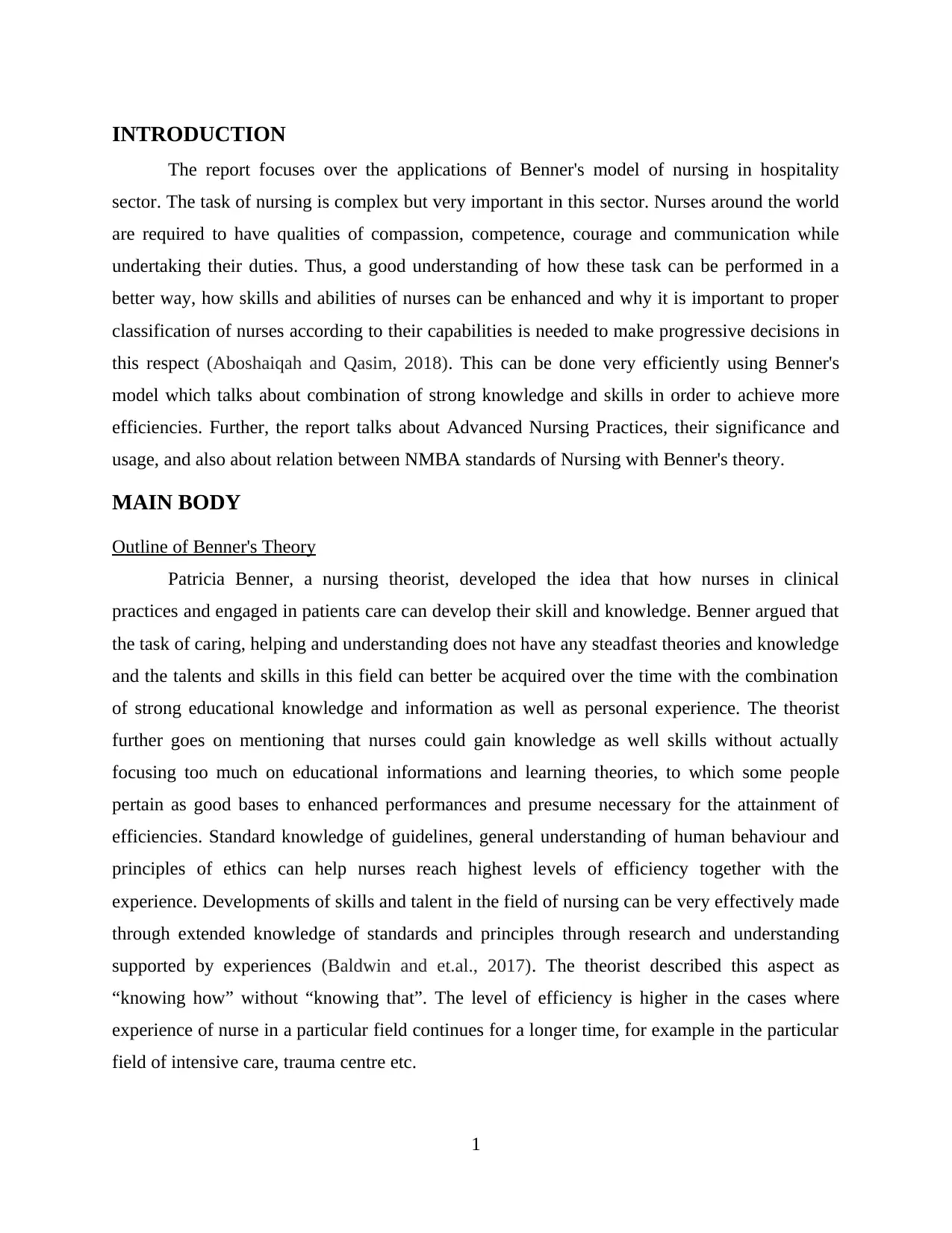
INTRODUCTION
The report focuses over the applications of Benner's model of nursing in hospitality
sector. The task of nursing is complex but very important in this sector. Nurses around the world
are required to have qualities of compassion, competence, courage and communication while
undertaking their duties. Thus, a good understanding of how these task can be performed in a
better way, how skills and abilities of nurses can be enhanced and why it is important to proper
classification of nurses according to their capabilities is needed to make progressive decisions in
this respect (Aboshaiqah and Qasim, 2018). This can be done very efficiently using Benner's
model which talks about combination of strong knowledge and skills in order to achieve more
efficiencies. Further, the report talks about Advanced Nursing Practices, their significance and
usage, and also about relation between NMBA standards of Nursing with Benner's theory.
MAIN BODY
Outline of Benner's Theory
Patricia Benner, a nursing theorist, developed the idea that how nurses in clinical
practices and engaged in patients care can develop their skill and knowledge. Benner argued that
the task of caring, helping and understanding does not have any steadfast theories and knowledge
and the talents and skills in this field can better be acquired over the time with the combination
of strong educational knowledge and information as well as personal experience. The theorist
further goes on mentioning that nurses could gain knowledge as well skills without actually
focusing too much on educational informations and learning theories, to which some people
pertain as good bases to enhanced performances and presume necessary for the attainment of
efficiencies. Standard knowledge of guidelines, general understanding of human behaviour and
principles of ethics can help nurses reach highest levels of efficiency together with the
experience. Developments of skills and talent in the field of nursing can be very effectively made
through extended knowledge of standards and principles through research and understanding
supported by experiences (Baldwin and et.al., 2017). The theorist described this aspect as
“knowing how” without “knowing that”. The level of efficiency is higher in the cases where
experience of nurse in a particular field continues for a longer time, for example in the particular
field of intensive care, trauma centre etc.
1
The report focuses over the applications of Benner's model of nursing in hospitality
sector. The task of nursing is complex but very important in this sector. Nurses around the world
are required to have qualities of compassion, competence, courage and communication while
undertaking their duties. Thus, a good understanding of how these task can be performed in a
better way, how skills and abilities of nurses can be enhanced and why it is important to proper
classification of nurses according to their capabilities is needed to make progressive decisions in
this respect (Aboshaiqah and Qasim, 2018). This can be done very efficiently using Benner's
model which talks about combination of strong knowledge and skills in order to achieve more
efficiencies. Further, the report talks about Advanced Nursing Practices, their significance and
usage, and also about relation between NMBA standards of Nursing with Benner's theory.
MAIN BODY
Outline of Benner's Theory
Patricia Benner, a nursing theorist, developed the idea that how nurses in clinical
practices and engaged in patients care can develop their skill and knowledge. Benner argued that
the task of caring, helping and understanding does not have any steadfast theories and knowledge
and the talents and skills in this field can better be acquired over the time with the combination
of strong educational knowledge and information as well as personal experience. The theorist
further goes on mentioning that nurses could gain knowledge as well skills without actually
focusing too much on educational informations and learning theories, to which some people
pertain as good bases to enhanced performances and presume necessary for the attainment of
efficiencies. Standard knowledge of guidelines, general understanding of human behaviour and
principles of ethics can help nurses reach highest levels of efficiency together with the
experience. Developments of skills and talent in the field of nursing can be very effectively made
through extended knowledge of standards and principles through research and understanding
supported by experiences (Baldwin and et.al., 2017). The theorist described this aspect as
“knowing how” without “knowing that”. The level of efficiency is higher in the cases where
experience of nurse in a particular field continues for a longer time, for example in the particular
field of intensive care, trauma centre etc.
1
⊘ This is a preview!⊘
Do you want full access?
Subscribe today to unlock all pages.

Trusted by 1+ million students worldwide
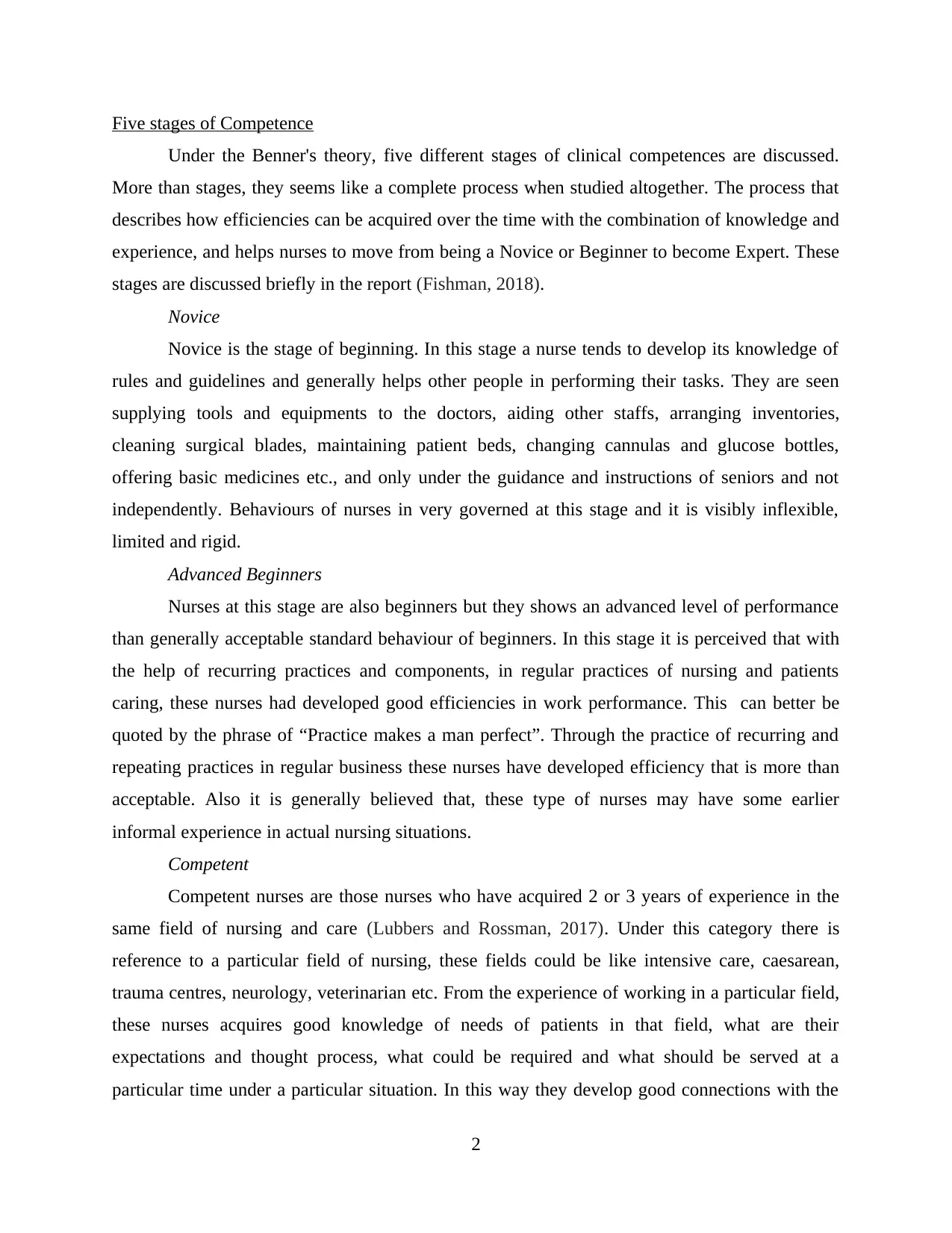
Five stages of Competence
Under the Benner's theory, five different stages of clinical competences are discussed.
More than stages, they seems like a complete process when studied altogether. The process that
describes how efficiencies can be acquired over the time with the combination of knowledge and
experience, and helps nurses to move from being a Novice or Beginner to become Expert. These
stages are discussed briefly in the report (Fishman, 2018).
Novice
Novice is the stage of beginning. In this stage a nurse tends to develop its knowledge of
rules and guidelines and generally helps other people in performing their tasks. They are seen
supplying tools and equipments to the doctors, aiding other staffs, arranging inventories,
cleaning surgical blades, maintaining patient beds, changing cannulas and glucose bottles,
offering basic medicines etc., and only under the guidance and instructions of seniors and not
independently. Behaviours of nurses in very governed at this stage and it is visibly inflexible,
limited and rigid.
Advanced Beginners
Nurses at this stage are also beginners but they shows an advanced level of performance
than generally acceptable standard behaviour of beginners. In this stage it is perceived that with
the help of recurring practices and components, in regular practices of nursing and patients
caring, these nurses had developed good efficiencies in work performance. This can better be
quoted by the phrase of “Practice makes a man perfect”. Through the practice of recurring and
repeating practices in regular business these nurses have developed efficiency that is more than
acceptable. Also it is generally believed that, these type of nurses may have some earlier
informal experience in actual nursing situations.
Competent
Competent nurses are those nurses who have acquired 2 or 3 years of experience in the
same field of nursing and care (Lubbers and Rossman, 2017). Under this category there is
reference to a particular field of nursing, these fields could be like intensive care, caesarean,
trauma centres, neurology, veterinarian etc. From the experience of working in a particular field,
these nurses acquires good knowledge of needs of patients in that field, what are their
expectations and thought process, what could be required and what should be served at a
particular time under a particular situation. In this way they develop good connections with the
2
Under the Benner's theory, five different stages of clinical competences are discussed.
More than stages, they seems like a complete process when studied altogether. The process that
describes how efficiencies can be acquired over the time with the combination of knowledge and
experience, and helps nurses to move from being a Novice or Beginner to become Expert. These
stages are discussed briefly in the report (Fishman, 2018).
Novice
Novice is the stage of beginning. In this stage a nurse tends to develop its knowledge of
rules and guidelines and generally helps other people in performing their tasks. They are seen
supplying tools and equipments to the doctors, aiding other staffs, arranging inventories,
cleaning surgical blades, maintaining patient beds, changing cannulas and glucose bottles,
offering basic medicines etc., and only under the guidance and instructions of seniors and not
independently. Behaviours of nurses in very governed at this stage and it is visibly inflexible,
limited and rigid.
Advanced Beginners
Nurses at this stage are also beginners but they shows an advanced level of performance
than generally acceptable standard behaviour of beginners. In this stage it is perceived that with
the help of recurring practices and components, in regular practices of nursing and patients
caring, these nurses had developed good efficiencies in work performance. This can better be
quoted by the phrase of “Practice makes a man perfect”. Through the practice of recurring and
repeating practices in regular business these nurses have developed efficiency that is more than
acceptable. Also it is generally believed that, these type of nurses may have some earlier
informal experience in actual nursing situations.
Competent
Competent nurses are those nurses who have acquired 2 or 3 years of experience in the
same field of nursing and care (Lubbers and Rossman, 2017). Under this category there is
reference to a particular field of nursing, these fields could be like intensive care, caesarean,
trauma centres, neurology, veterinarian etc. From the experience of working in a particular field,
these nurses acquires good knowledge of needs of patients in that field, what are their
expectations and thought process, what could be required and what should be served at a
particular time under a particular situation. In this way they develop good connections with the
2
Paraphrase This Document
Need a fresh take? Get an instant paraphrase of this document with our AI Paraphraser
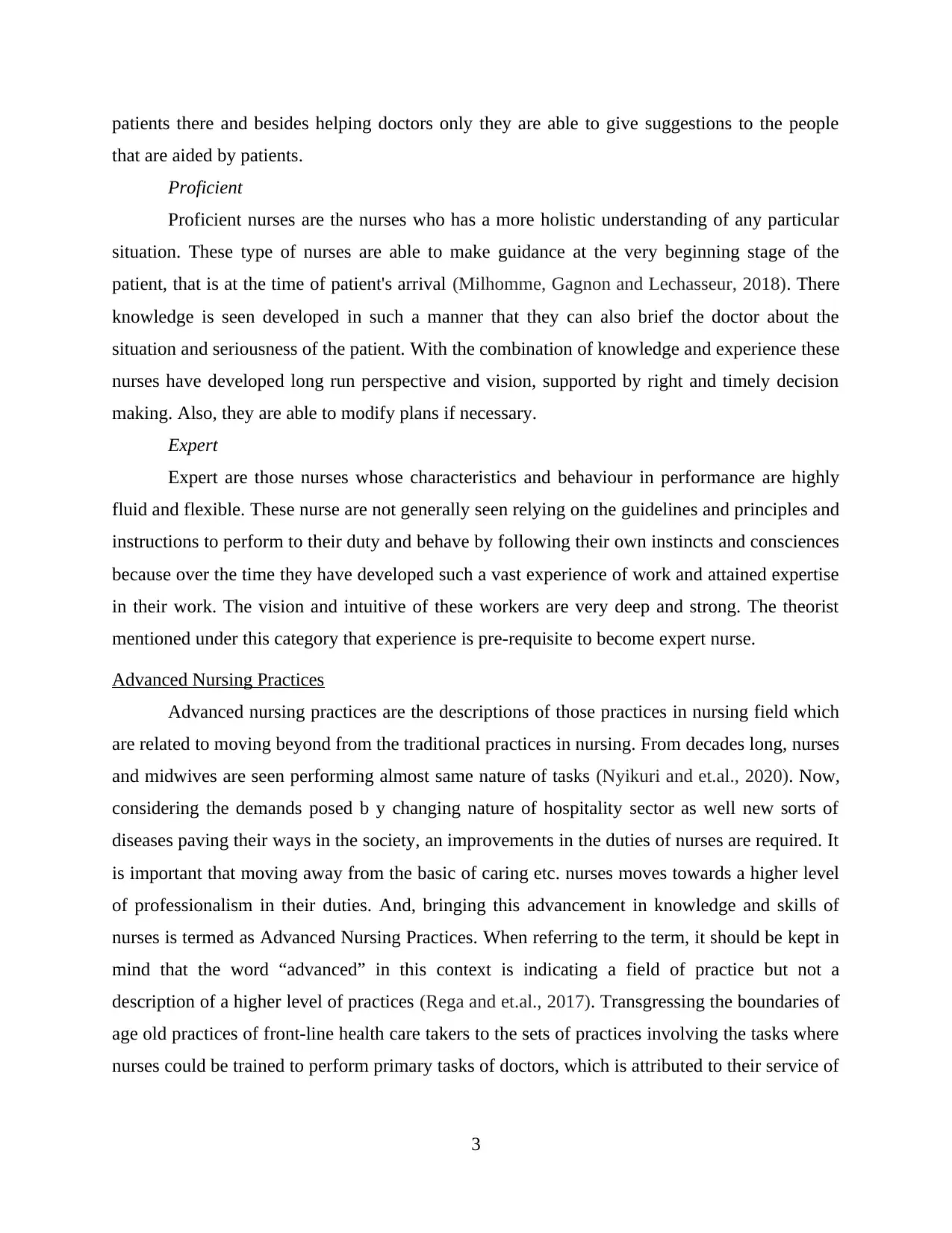
patients there and besides helping doctors only they are able to give suggestions to the people
that are aided by patients.
Proficient
Proficient nurses are the nurses who has a more holistic understanding of any particular
situation. These type of nurses are able to make guidance at the very beginning stage of the
patient, that is at the time of patient's arrival (Milhomme, Gagnon and Lechasseur, 2018). There
knowledge is seen developed in such a manner that they can also brief the doctor about the
situation and seriousness of the patient. With the combination of knowledge and experience these
nurses have developed long run perspective and vision, supported by right and timely decision
making. Also, they are able to modify plans if necessary.
Expert
Expert are those nurses whose characteristics and behaviour in performance are highly
fluid and flexible. These nurse are not generally seen relying on the guidelines and principles and
instructions to perform to their duty and behave by following their own instincts and consciences
because over the time they have developed such a vast experience of work and attained expertise
in their work. The vision and intuitive of these workers are very deep and strong. The theorist
mentioned under this category that experience is pre-requisite to become expert nurse.
Advanced Nursing Practices
Advanced nursing practices are the descriptions of those practices in nursing field which
are related to moving beyond from the traditional practices in nursing. From decades long, nurses
and midwives are seen performing almost same nature of tasks (Nyikuri and et.al., 2020). Now,
considering the demands posed b y changing nature of hospitality sector as well new sorts of
diseases paving their ways in the society, an improvements in the duties of nurses are required. It
is important that moving away from the basic of caring etc. nurses moves towards a higher level
of professionalism in their duties. And, bringing this advancement in knowledge and skills of
nurses is termed as Advanced Nursing Practices. When referring to the term, it should be kept in
mind that the word “advanced” in this context is indicating a field of practice but not a
description of a higher level of practices (Rega and et.al., 2017). Transgressing the boundaries of
age old practices of front-line health care takers to the sets of practices involving the tasks where
nurses could be trained to perform primary tasks of doctors, which is attributed to their service of
3
that are aided by patients.
Proficient
Proficient nurses are the nurses who has a more holistic understanding of any particular
situation. These type of nurses are able to make guidance at the very beginning stage of the
patient, that is at the time of patient's arrival (Milhomme, Gagnon and Lechasseur, 2018). There
knowledge is seen developed in such a manner that they can also brief the doctor about the
situation and seriousness of the patient. With the combination of knowledge and experience these
nurses have developed long run perspective and vision, supported by right and timely decision
making. Also, they are able to modify plans if necessary.
Expert
Expert are those nurses whose characteristics and behaviour in performance are highly
fluid and flexible. These nurse are not generally seen relying on the guidelines and principles and
instructions to perform to their duty and behave by following their own instincts and consciences
because over the time they have developed such a vast experience of work and attained expertise
in their work. The vision and intuitive of these workers are very deep and strong. The theorist
mentioned under this category that experience is pre-requisite to become expert nurse.
Advanced Nursing Practices
Advanced nursing practices are the descriptions of those practices in nursing field which
are related to moving beyond from the traditional practices in nursing. From decades long, nurses
and midwives are seen performing almost same nature of tasks (Nyikuri and et.al., 2020). Now,
considering the demands posed b y changing nature of hospitality sector as well new sorts of
diseases paving their ways in the society, an improvements in the duties of nurses are required. It
is important that moving away from the basic of caring etc. nurses moves towards a higher level
of professionalism in their duties. And, bringing this advancement in knowledge and skills of
nurses is termed as Advanced Nursing Practices. When referring to the term, it should be kept in
mind that the word “advanced” in this context is indicating a field of practice but not a
description of a higher level of practices (Rega and et.al., 2017). Transgressing the boundaries of
age old practices of front-line health care takers to the sets of practices involving the tasks where
nurses could be trained to perform primary tasks of doctors, which is attributed to their service of
3
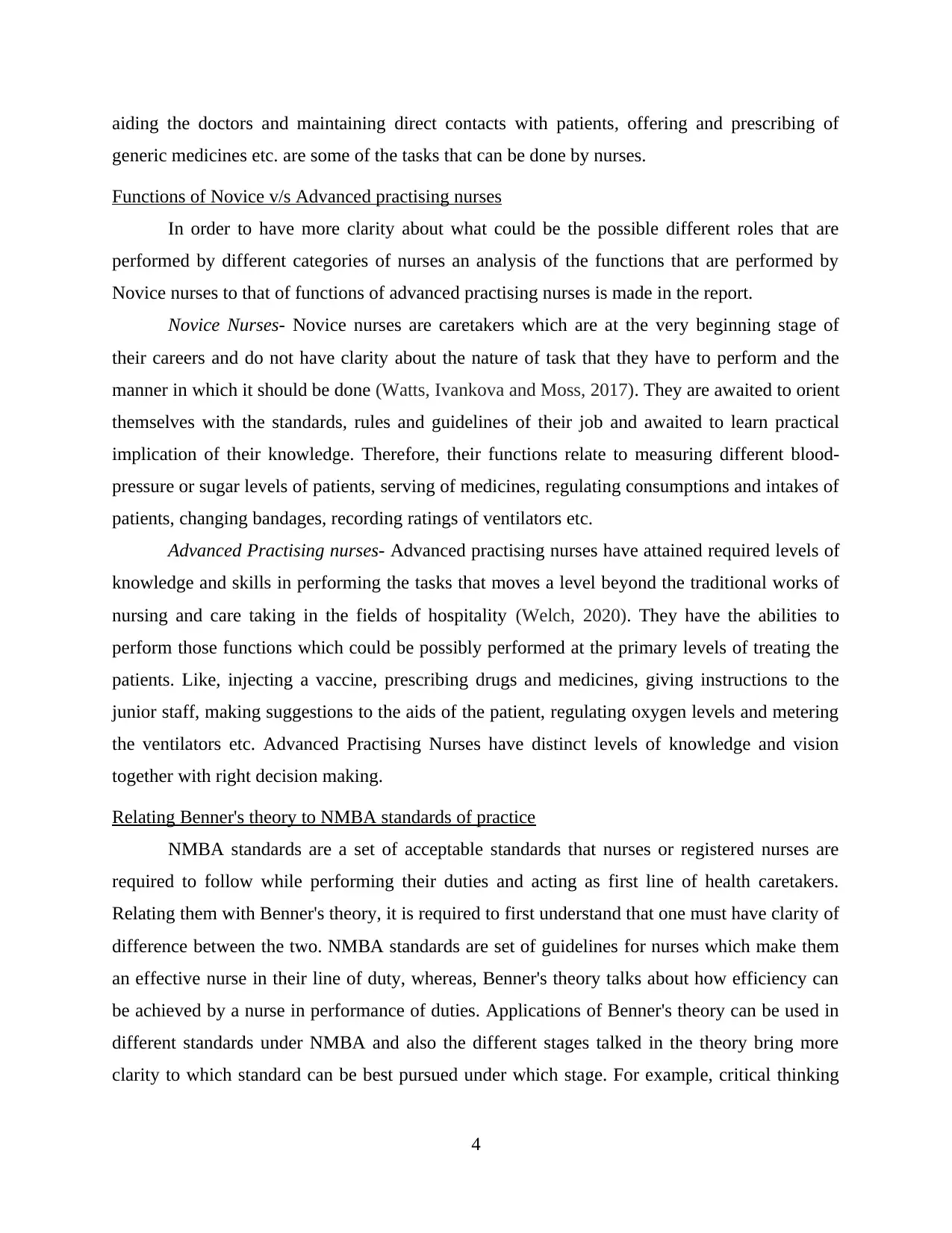
aiding the doctors and maintaining direct contacts with patients, offering and prescribing of
generic medicines etc. are some of the tasks that can be done by nurses.
Functions of Novice v/s Advanced practising nurses
In order to have more clarity about what could be the possible different roles that are
performed by different categories of nurses an analysis of the functions that are performed by
Novice nurses to that of functions of advanced practising nurses is made in the report.
Novice Nurses- Novice nurses are caretakers which are at the very beginning stage of
their careers and do not have clarity about the nature of task that they have to perform and the
manner in which it should be done (Watts, Ivankova and Moss, 2017). They are awaited to orient
themselves with the standards, rules and guidelines of their job and awaited to learn practical
implication of their knowledge. Therefore, their functions relate to measuring different blood-
pressure or sugar levels of patients, serving of medicines, regulating consumptions and intakes of
patients, changing bandages, recording ratings of ventilators etc.
Advanced Practising nurses- Advanced practising nurses have attained required levels of
knowledge and skills in performing the tasks that moves a level beyond the traditional works of
nursing and care taking in the fields of hospitality (Welch, 2020). They have the abilities to
perform those functions which could be possibly performed at the primary levels of treating the
patients. Like, injecting a vaccine, prescribing drugs and medicines, giving instructions to the
junior staff, making suggestions to the aids of the patient, regulating oxygen levels and metering
the ventilators etc. Advanced Practising Nurses have distinct levels of knowledge and vision
together with right decision making.
Relating Benner's theory to NMBA standards of practice
NMBA standards are a set of acceptable standards that nurses or registered nurses are
required to follow while performing their duties and acting as first line of health caretakers.
Relating them with Benner's theory, it is required to first understand that one must have clarity of
difference between the two. NMBA standards are set of guidelines for nurses which make them
an effective nurse in their line of duty, whereas, Benner's theory talks about how efficiency can
be achieved by a nurse in performance of duties. Applications of Benner's theory can be used in
different standards under NMBA and also the different stages talked in the theory bring more
clarity to which standard can be best pursued under which stage. For example, critical thinking
4
generic medicines etc. are some of the tasks that can be done by nurses.
Functions of Novice v/s Advanced practising nurses
In order to have more clarity about what could be the possible different roles that are
performed by different categories of nurses an analysis of the functions that are performed by
Novice nurses to that of functions of advanced practising nurses is made in the report.
Novice Nurses- Novice nurses are caretakers which are at the very beginning stage of
their careers and do not have clarity about the nature of task that they have to perform and the
manner in which it should be done (Watts, Ivankova and Moss, 2017). They are awaited to orient
themselves with the standards, rules and guidelines of their job and awaited to learn practical
implication of their knowledge. Therefore, their functions relate to measuring different blood-
pressure or sugar levels of patients, serving of medicines, regulating consumptions and intakes of
patients, changing bandages, recording ratings of ventilators etc.
Advanced Practising nurses- Advanced practising nurses have attained required levels of
knowledge and skills in performing the tasks that moves a level beyond the traditional works of
nursing and care taking in the fields of hospitality (Welch, 2020). They have the abilities to
perform those functions which could be possibly performed at the primary levels of treating the
patients. Like, injecting a vaccine, prescribing drugs and medicines, giving instructions to the
junior staff, making suggestions to the aids of the patient, regulating oxygen levels and metering
the ventilators etc. Advanced Practising Nurses have distinct levels of knowledge and vision
together with right decision making.
Relating Benner's theory to NMBA standards of practice
NMBA standards are a set of acceptable standards that nurses or registered nurses are
required to follow while performing their duties and acting as first line of health caretakers.
Relating them with Benner's theory, it is required to first understand that one must have clarity of
difference between the two. NMBA standards are set of guidelines for nurses which make them
an effective nurse in their line of duty, whereas, Benner's theory talks about how efficiency can
be achieved by a nurse in performance of duties. Applications of Benner's theory can be used in
different standards under NMBA and also the different stages talked in the theory bring more
clarity to which standard can be best pursued under which stage. For example, critical thinking
4
⊘ This is a preview!⊘
Do you want full access?
Subscribe today to unlock all pages.

Trusted by 1+ million students worldwide
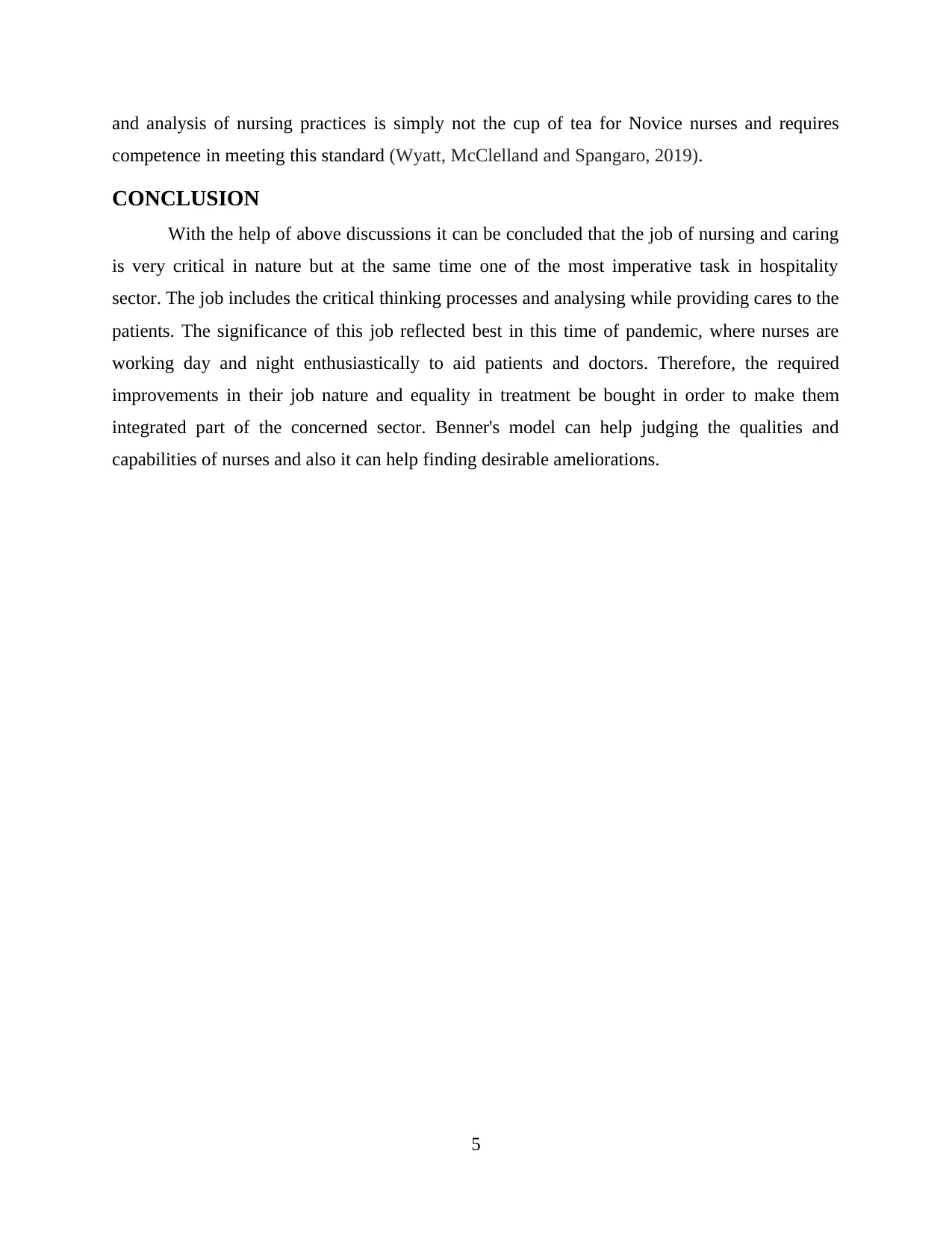
and analysis of nursing practices is simply not the cup of tea for Novice nurses and requires
competence in meeting this standard (Wyatt, McClelland and Spangaro, 2019).
CONCLUSION
With the help of above discussions it can be concluded that the job of nursing and caring
is very critical in nature but at the same time one of the most imperative task in hospitality
sector. The job includes the critical thinking processes and analysing while providing cares to the
patients. The significance of this job reflected best in this time of pandemic, where nurses are
working day and night enthusiastically to aid patients and doctors. Therefore, the required
improvements in their job nature and equality in treatment be bought in order to make them
integrated part of the concerned sector. Benner's model can help judging the qualities and
capabilities of nurses and also it can help finding desirable ameliorations.
5
competence in meeting this standard (Wyatt, McClelland and Spangaro, 2019).
CONCLUSION
With the help of above discussions it can be concluded that the job of nursing and caring
is very critical in nature but at the same time one of the most imperative task in hospitality
sector. The job includes the critical thinking processes and analysing while providing cares to the
patients. The significance of this job reflected best in this time of pandemic, where nurses are
working day and night enthusiastically to aid patients and doctors. Therefore, the required
improvements in their job nature and equality in treatment be bought in order to make them
integrated part of the concerned sector. Benner's model can help judging the qualities and
capabilities of nurses and also it can help finding desirable ameliorations.
5
Paraphrase This Document
Need a fresh take? Get an instant paraphrase of this document with our AI Paraphraser
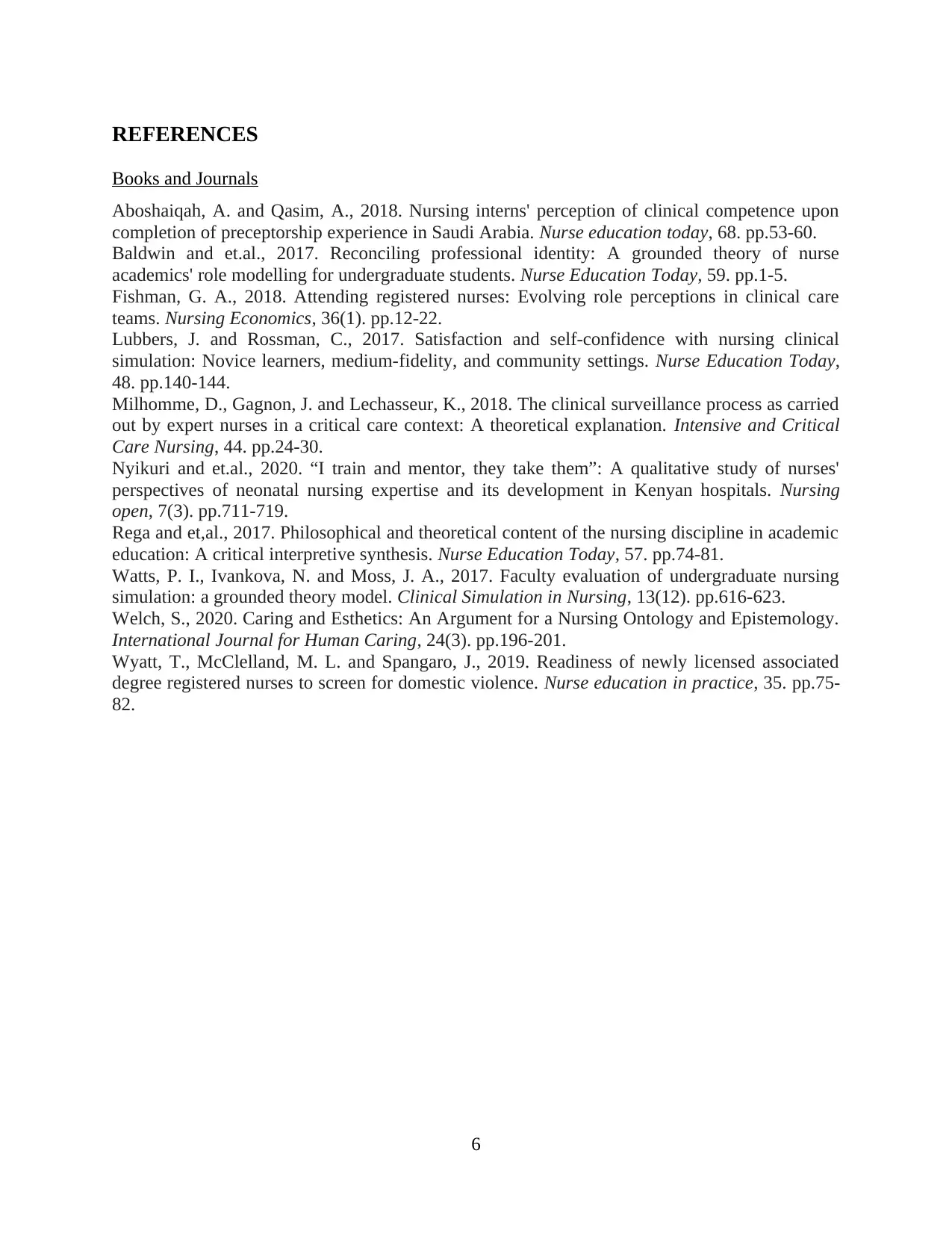
REFERENCES
Books and Journals
Aboshaiqah, A. and Qasim, A., 2018. Nursing interns' perception of clinical competence upon
completion of preceptorship experience in Saudi Arabia. Nurse education today, 68. pp.53-60.
Baldwin and et.al., 2017. Reconciling professional identity: A grounded theory of nurse
academics' role modelling for undergraduate students. Nurse Education Today, 59. pp.1-5.
Fishman, G. A., 2018. Attending registered nurses: Evolving role perceptions in clinical care
teams. Nursing Economics, 36(1). pp.12-22.
Lubbers, J. and Rossman, C., 2017. Satisfaction and self-confidence with nursing clinical
simulation: Novice learners, medium-fidelity, and community settings. Nurse Education Today,
48. pp.140-144.
Milhomme, D., Gagnon, J. and Lechasseur, K., 2018. The clinical surveillance process as carried
out by expert nurses in a critical care context: A theoretical explanation. Intensive and Critical
Care Nursing, 44. pp.24-30.
Nyikuri and et.al., 2020. “I train and mentor, they take them”: A qualitative study of nurses'
perspectives of neonatal nursing expertise and its development in Kenyan hospitals. Nursing
open, 7(3). pp.711-719.
Rega and et,al., 2017. Philosophical and theoretical content of the nursing discipline in academic
education: A critical interpretive synthesis. Nurse Education Today, 57. pp.74-81.
Watts, P. I., Ivankova, N. and Moss, J. A., 2017. Faculty evaluation of undergraduate nursing
simulation: a grounded theory model. Clinical Simulation in Nursing, 13(12). pp.616-623.
Welch, S., 2020. Caring and Esthetics: An Argument for a Nursing Ontology and Epistemology.
International Journal for Human Caring, 24(3). pp.196-201.
Wyatt, T., McClelland, M. L. and Spangaro, J., 2019. Readiness of newly licensed associated
degree registered nurses to screen for domestic violence. Nurse education in practice, 35. pp.75-
82.
6
Books and Journals
Aboshaiqah, A. and Qasim, A., 2018. Nursing interns' perception of clinical competence upon
completion of preceptorship experience in Saudi Arabia. Nurse education today, 68. pp.53-60.
Baldwin and et.al., 2017. Reconciling professional identity: A grounded theory of nurse
academics' role modelling for undergraduate students. Nurse Education Today, 59. pp.1-5.
Fishman, G. A., 2018. Attending registered nurses: Evolving role perceptions in clinical care
teams. Nursing Economics, 36(1). pp.12-22.
Lubbers, J. and Rossman, C., 2017. Satisfaction and self-confidence with nursing clinical
simulation: Novice learners, medium-fidelity, and community settings. Nurse Education Today,
48. pp.140-144.
Milhomme, D., Gagnon, J. and Lechasseur, K., 2018. The clinical surveillance process as carried
out by expert nurses in a critical care context: A theoretical explanation. Intensive and Critical
Care Nursing, 44. pp.24-30.
Nyikuri and et.al., 2020. “I train and mentor, they take them”: A qualitative study of nurses'
perspectives of neonatal nursing expertise and its development in Kenyan hospitals. Nursing
open, 7(3). pp.711-719.
Rega and et,al., 2017. Philosophical and theoretical content of the nursing discipline in academic
education: A critical interpretive synthesis. Nurse Education Today, 57. pp.74-81.
Watts, P. I., Ivankova, N. and Moss, J. A., 2017. Faculty evaluation of undergraduate nursing
simulation: a grounded theory model. Clinical Simulation in Nursing, 13(12). pp.616-623.
Welch, S., 2020. Caring and Esthetics: An Argument for a Nursing Ontology and Epistemology.
International Journal for Human Caring, 24(3). pp.196-201.
Wyatt, T., McClelland, M. L. and Spangaro, J., 2019. Readiness of newly licensed associated
degree registered nurses to screen for domestic violence. Nurse education in practice, 35. pp.75-
82.
6
1 out of 8
Related Documents
Your All-in-One AI-Powered Toolkit for Academic Success.
+13062052269
info@desklib.com
Available 24*7 on WhatsApp / Email
![[object Object]](/_next/static/media/star-bottom.7253800d.svg)
Unlock your academic potential
Copyright © 2020–2026 A2Z Services. All Rights Reserved. Developed and managed by ZUCOL.





